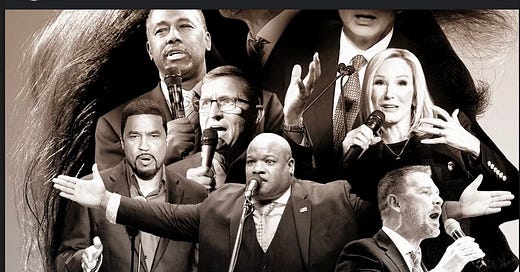Trump is Immoral. No Big Deal.
The Paradox of Voter Support: Black Voters and Evangelicals Backing Trump in 2024
Image from https://www.axios.com/2024/01/12/how-maga-pastors-boost-trump-campaign-2024
I applied GPT4 to the website PewResearch.org on this topic. I found that this article was much more difficult to generate than previous ones, probably due to the amount of data I was running through the LLMs, I could have spent much more than two hours compiling this piece, yet I feel that the research reviewed through the PewResearch site helped me to write a factually informative article. *References at the end of the article.
Most Black voters are critical of Trump; 72% say he was a poor or terrible president, and 65% believe he broke the law in his alleged efforts to change the outcome of the 2020 election. Despite their support for Biden, about half of Black voters say they would replace both Biden and Trump with different candidates if given the chance. This sentiment is particularly pronounced among younger Black voters and those with college degrees. Younger Black voters are more likely than older ones to consider voting for Trump, with 29% of Black voters under 50 supporting Trump compared to only 9% of those 50 and older.
Traditionally, both evangelical voters and Black voters have held high moral standards for their political leaders, making Trump’s continued support within these groups particularly perplexing. As the 2024 Presidential Election approaches, this paradox within the Black electorate and among evangelical Christians highlights a significant shift in American values and political priorities.
It is not surprising that one of the key factors influencing this phenomenon is the role of modern media. Social media platforms and alternative news sources have dramatically reshaped public perception, creating echo chambers where voters are exposed predominantly to information that reinforces their preexisting beliefs. This selective information consumption allows narratives to be crafted that downplay or rationalize Trump’s controversial actions and statements, making his past transgressions less salient to his supporters. The bias of television media, lack of comprehensive education, and the influence of foreign powers like China and Russia manipulating social media further exacerbate this issue.
For many evangelical Christians, Trump’s policy positions on issues such as abortion, religious freedom, and conservative judicial appointments align closely with their core beliefs. This alignment often takes precedence over his personal behavior. Trump's combative style and portrayal as a defender against a perceived liberal agenda resonate deeply within this community, framing him as a necessary figure in the cultural and ideological battles they prioritize.
Economic concerns also play a crucial role in Trump’s appeal. Many voters, including a significant portion of Black voters, prioritize economic stability and policy outcomes over the character of the individual candidate. Trump’s business background and the economic growth experienced during his administration before the pandemic resonate with those who prioritize financial security. This pragmatic approach to voting reflects a broader shift in values, where the ends justify the means.
Disillusionment with the political status quo further contributes to this paradox. A notable number of Black voters feel that the Democratic Party has taken their support for granted without delivering substantial improvements in their communities. This dissatisfaction drives them to consider alternative candidates, including Trump, who is perceived as an outsider willing to challenge the established order. This sentiment is particularly strong among younger Black voters and those with higher education, who are more open to alternative perspectives and solutions.
Another critical aspect of Trump’s appeal is his rhetoric of retribution and revenge. Trump has openly discussed his desire to dismantle parts of the federal government, weaponize the judicial branch against perceived enemies, and employ retribution against those he believes have wronged him. Remarkably, many of his supporters seem either unaware of these intentions or unconcerned by them. This ignorance can be attributed to several factors.
Not surprisingly, the same media echo chambers that downplay Trump’s controversial past also often ignore or reframe his most extreme statements. Supporters consuming this media are less likely to be exposed to critical analyses of Trump’s retributive rhetoric. Secondly, for some voters, especially those feeling marginalized or disenfranchised, Trump’s promise of upheaval and retribution may be seen as a positive force capable of disrupting a system they feel is rigged against them. Lastly, a pervasive distrust in traditional media sources leads many of Trump’s supporters to dismiss any negative reports about him as biased or fake news.
The willingness to overlook Trump’s legal and personal flaws, and even his extreme rhetoric, indicates a more flexible approach to morality in the political arena. Voters are increasingly prioritizing policy outcomes and ideological battles over the personal integrity of candidates. This shift is influenced by a high-stakes political climate where many feel that fundamental aspects of their identity and values are at stake.
The paradox of evangelical and Black voter support for Donald Trump in the 2024 election underscores a profound transformation in American political and cultural values. The prioritization of political and economic alignment over personal integrity reflects a broader shift in the electorate’s approach to leadership and governance. Trump’s vows to dismantle the federal government and employ retribution against his enemies pose a significant danger to American ideals and democratic principles. As the nation navigates these changes, the upcoming election will serve as a critical juncture in defining the future direction of American values and the role of morality in politics. Many of Trump’s supporters cannot see the peril he represents to the nation's democratic foundations. Often they are blinded by a mix of selective information, economic desperation, and deep-seated distrust in the current political system.
It is frightening so many voters do not recognize the gravity of this moment in history. Without an electorate that is well informed to make choices that reflect the true values of democracy, integrity and justice, pillars of American democracy will fail.
https://www.pewresearch.org/politics/2024/06/06/cultural-issues-and-the-2024-election/
https://www.pewresearch.org/race-and-ethnicity/2024/05/20/an-early-look-at-black-voters-views-on-biden-trump-and-election-2024/
https://www.pewresearch.org/short-reads/2024/06/18/satisfaction-with-democracy-has-declined-in-recent-years-in-high-income-nations/
https://www.pewresearch.org/topic/politics-policy/





